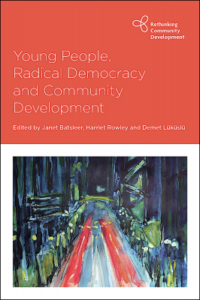With thanks to Janet Batsleer (@JanetBatsleer1), Dena Arya (@dnaarya) and Mae Shaw.
When England played Iran in the World Cup, fans’ placards declared ‘Women Life Freedom’. The Iranian players stood silently as their national anthem was played, risking retribution when they returned home.
Those playing for England were also embroiled in debates of so-called gesture politics, forfeiting the wearing of the OneLove armband in support of the LGBTQ+ community after FIFA threatened sanctions, the debate considered ‘too live’ on account of the hosts’ record. Instead, they took the knee as a more accepted form of solidarity popularised as part of the Black Lives Matter movement, while Jack Grealish showed his support for the disabled community by celebrating his goal in a way requested by a young fan with cerebral palsy.
But what has this football match got to do with rethinking community development? Football, like politics, occurs in everyday life; much like other ways of building community, it brings people together and breaks others apart. It is inherently part of youth culture and thus offers a test ground for the live debates of our times. Our new book is concerned with the struggles and social movements led by young people today, and the ways these may permeate the practice of community workers who take a youth-centred, critical and enlivening approach to their practice.
We as adults, especially those of us who work alongside young people, have much to learn from the revolutions of thought, solidarity and reimagination that can occur in everyday life. We witness them in many of today’s debates around the globe, including the climate crisis, the ecological crisis affecting food and water, practices of citizenship within the LGBTQ+ young community, global movements against caste and colonial forms of practice, which subject young people to symbolic and material violence.
Young people must not be romanticised, but we should aim to dislodge binary discourses which either position them as ‘the hope for the future’ or as possessed by monstrous and demonic destructive urges which ‘community’ needs to hold at bay. ‘Community’ is now often claimed by authoritarian populism as a divisive and violent mechanism to attack all those it has excluded from citizenship. Young people are at the forefront of these struggles and so their calls are often the loudest. ‘Community’ can be rediscovered to express the making of community and connection, enabling care and mutuality across (often imposed) difference and assumed dis/connection. This is what it means to practise active hope and where prefigurative, radical democratic practice is created.
Practising hope in opposition to capitalist realism and neoliberal forms of community development is an important theme. Picking up and echoing the poet June Jordan’s words, despite the power of authoritarian versions of community, it is not who we are but what we can do for one another that will determine a connection. Such practices of hope are fragile and transitory; they depend on new forms of world- and community-making beyond those of globalisation. These complex and nuanced practices are emerging in cracks and fissures to support learning radical democracy.
On getting knocked out of the World Cup, some of the Iranian fans interviewed courageously used the opportunity to speak out against the government. Rather than giving their names, they replied ‘We are all Mahsa Amini’. Aside from debates around the politics of difference and the dangers of using politics for the pursuit of a common good for all, such events remind us that creating opportunities for gestures and acts of solidarity to emerge in everyday life – across differences, across communities – matters. Through this work we may be engaged in politics of the impossible, but we urge you to remain at the forefront, in threshold and liminal spaces and places, in times of turbulence and delight with young people, where it is possible to sustain a possibility of extended equality, liberty, solidarity and care: what we call a radical democracy-to-come.
Harriet Rowley is Senior Lecturer in Education and Community at Manchester Metropolitan University.
 Young People, Radical Democracy and Community Development edited by Janet Batsleer, Harriet Rowley and Demet Lüküslü. Order here for £29.99.
Young People, Radical Democracy and Community Development edited by Janet Batsleer, Harriet Rowley and Demet Lüküslü. Order here for £29.99.
Bristol University Press/Policy Press newsletter subscribers receive a 25% discount – sign up here.
Individual chapters from the book are available for purchase from Bristol University Press Digital. You can also ask your library to subscribe or sign up for a free trial.
Follow Transforming Society so we can let you know when new articles publish.
The views and opinions expressed on this blog site are solely those of the original blog post authors and other contributors. These views and opinions do not necessarily represent those of the Policy Press and/or any/all contributors to this site.
Image Credit: Andrew Fox via Alamy


